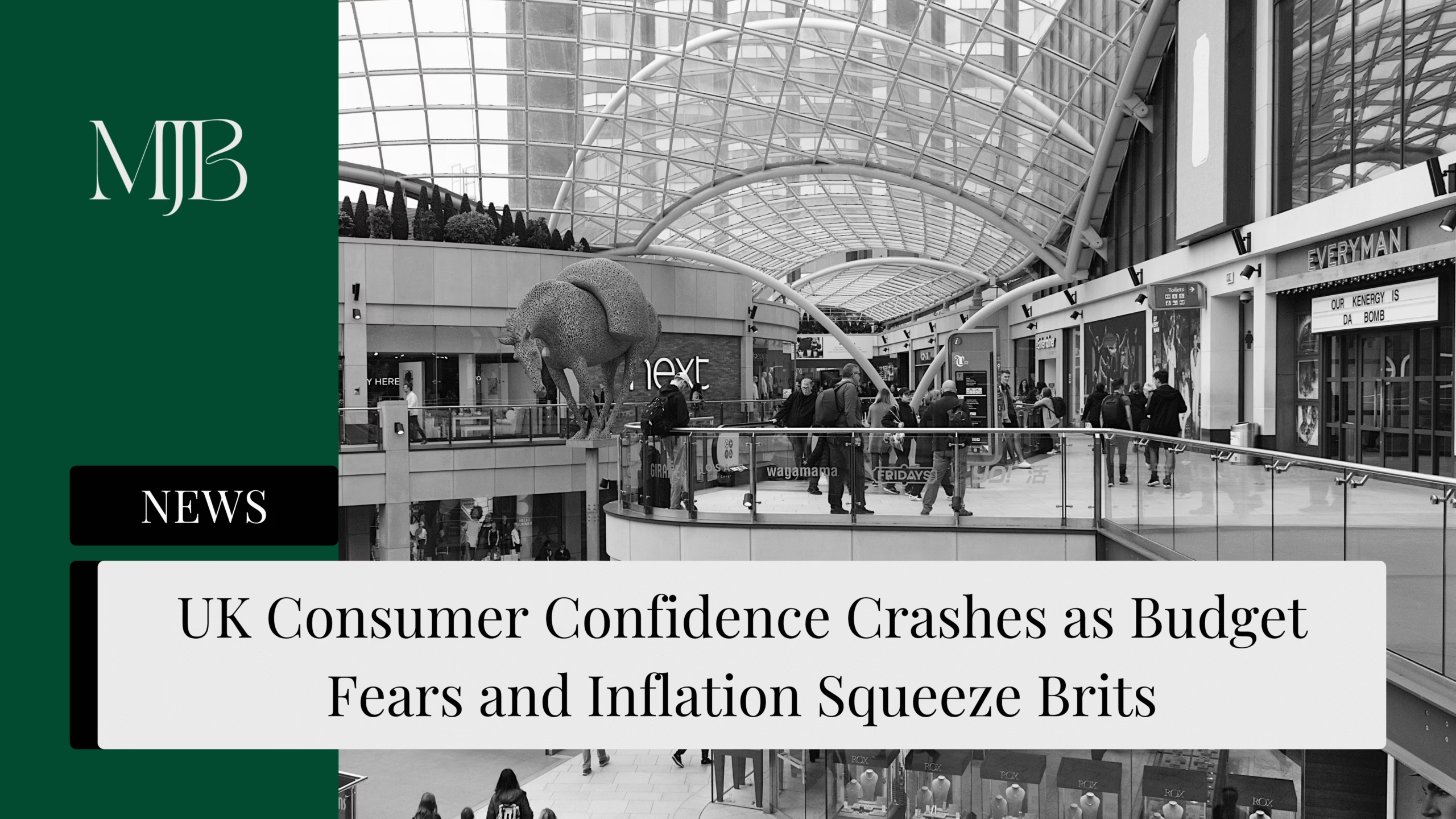September wasn’t kind to British wallets—or minds. Consumer confidence in the UK took another hit as people brace for potential tax hikes and watch inflation refuse to budge. With the autumn budget looming and living costs still climbing, Brits are tightening their belts and their expectations.
The British Retail Consortium’s latest data shows economic confidence dropping to -36 (down from -32 in August), while personal financial outlook slipped to -7. That’s four months straight of declining confidence. Not exactly the comeback story anyone wanted.
Why Everyone’s Feeling the Squeeze Right Now
Budget Anxiety is Real
Chancellor Rachel Reeves November 26th budget announcement has everyone playing guessing games. Will taxes go up? Which ones? By how much? When people don’t know what’s coming, they tend to assume the worst—and act accordingly.
Helen Dickinson, CEO of the British Retail Consortium, put it bluntly: “Worries about the Budget, combined with the increase in the cost of living, have eroded confidence.”
Inflation Refuses to Play Ball
Inflation stayed stuck at 3.8% in August. That’s nearly double the Bank of England’s 2% target, and food prices are the main culprit. Core food inflation hit 5.1%—its fifth consecutive monthly rise.
Translation? Your weekly grocery shop keeps getting pricier, and there’s no relief in sight.

Interest Rates Aren’t Going Anywhere Soon
With inflation this stubborn, the Bank of England’s hands are tied. Danni Hewson from AJ Bell summed it up: “At 3.8%, inflation is way above the Bank’s target and prices are expected to keep rising in the near term.”
Markets are now betting on maybe one final rate cut in 2025—emphasis on maybe. If you were hoping for cheaper mortgages anytime soon, you might want to adjust those expectations.
Millennials Are Getting Hit the Hardest
The 29-44 age group saw their confidence “dramatically” crater this month, according to Dickinson. Both economic expectations and personal finance outlook dropped by double digits.
Why millennials? They’re prime home-buying age, but mortgage rates are still sky-high and house prices aren’t budging. Labour’s promised housing boom hasn’t materialised yet, leaving this generation stuck between wanting to buy and actually being able to afford it.

What’s Next for UK Consumers?
Consumer confidence isn’t just a fancy economic indicator—it’s a real-world predictor of spending, saving, and economic activity. When people feel pessimistic, they spend less, which can create a self-fulfilling prophecy of economic slowdown.
With personal spending expectations dropping to +14, retailers are likely feeling nervous heading into the crucial Christmas shopping season.
All eyes are now on November 26th. Whatever the Chancellor announces could either restore some confidence or send it tumbling further.
Ready to stay ahead of UK economic shifts? Subscribe to our weekly finance newsletter for the latest insights that actually matter to your wallet.
FAQ
Q1: Will the Bank of England cut interest rates before Christmas?
A: Highly unlikely. With inflation at 3.8%—well above the 2% target—the Bank won’t risk stoking price rises further. Most experts expect rates to stay put until 2025.
Q2: Why are millennials more worried than other age groups?
A: They’re caught in the property trap. At prime home-buying age but facing high mortgage rates and expensive houses, many feel financially stuck. This age group saw the biggest confidence drop in September.
Q3: How bad could the autumn budget be for consumers?
A: Nobody knows yet, but the speculation alone is hurting confidence. Tax rises seem likely given the government’s fiscal position, which explains why people are preparing for the worst.
Q4: Is this just a UK problem?
A: The UK faces unique challenges with persistent food inflation and post-Brexit economic adjustments. While other countries have inflation issues, the UK’s combination of factors makes it particularly challenging.
Q5: When might consumer confidence recover?
A: Much depends on the November budget and whether inflation finally starts falling. If the Chancellor avoids harsh tax hikes and food prices stabilize, confidence could bounce back by early 2025.
DISCLAIMER
Effective Date: 15th July 2025
The information provided on this website is for informational and educational purposes only and reflects the personal opinions of the author(s). It is not intended as financial, investment, tax, or legal advice.
We are not certified financial advisers. None of the content on this website constitutes a recommendation to buy, sell, or hold any financial product, asset, or service. You should not rely on any information provided here to make financial decisions.
We strongly recommend that you:
- Conduct your own research and due diligence
- Consult with a qualified financial adviser or professional before making any investment or financial decisions
While we strive to ensure that all information is accurate and up to date, we make no guarantees about the completeness, reliability, or suitability of any content on this site.
By using this website, you acknowledge and agree that we are not responsible for any financial loss, damage, or decisions made based on the content presented.






